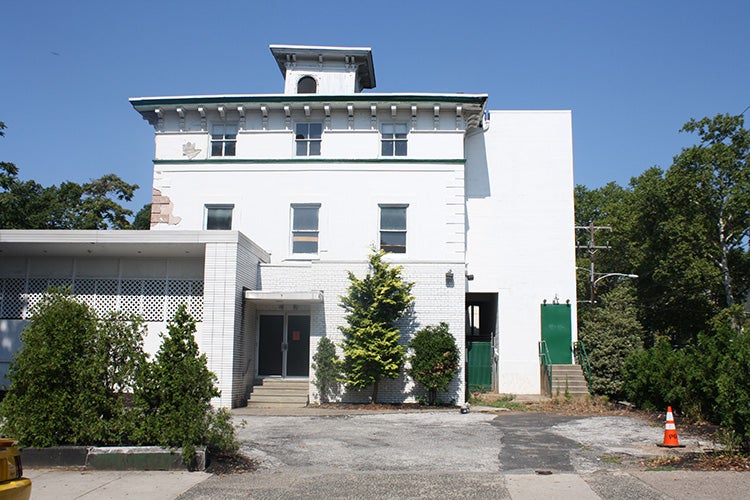ZBA hearing on historic mansion continued

The University of Pennsylvania and developer Jonathan Weiss sought zoning relief Wednesday afternoon for a proposed five-story, 122-unit, market-rate student housing development at 40th and Pine, where a historic mansion currently sits waiting for news of its fate.
The relief—the developer is seeking six variances, in all—are being opposed by a group of residents of the surrounding neighborhood. The Zoning Board of Adjustment had scheduled 1 ¾ hours for Wednesday’s hearing. Penn argued its case first, and Paul Boni, the attorney for the opposition, was unable to bring all his witnesses in the remaining time. The hearing failed to conclude, and another hearing, presumably the last, will be scheduled by the ZBA.
Testifying on behalf of the University Wednesday afternoon were Paul Sehnert, Penn’s director or real estate development, and Harris Steinberg, executive director of PennPraxis, which is PlanPhilly’s parent organization and the “applied research arm” of Penn’s School of Design. Both witnesses were called by Matt McClure, of Ballard Spahr, who is representing the university in the case.
Under McClure’s direction, Sehnert described the market conditions in the neighborhood as ripe for more student housing. Sehnert said the vast majority of buildings in the surrounding area are renter-occupied, and that the building in question is an out-of-use eyesore. He said that market-rate student housing is the “highest and best use” of the parcel.
“[Penn] bought this property because it was a vacant, blighted, former nursing home that was quite an objectionable presence in the neighborhood,” Sehnert said. “… When we bought it, the idea was to help address and improve the area.”
Harris Steinberg said that the project proposal is “sympathetic and not out of context” with the scale and use of surrounding parcels. He acknowledged that the stretch of 40th Street the parcel sits on is a “significant public transportation corridor,” and said that the developer’s plan to provide no parking spaces is “a smart move from a planning perspective.” He also said that it is not necessarily inappropriate to treat corner lots, such as the lot in question, differently from mid-block lots.
McClure also called Ed Halligan, president of Spruce Hill Community Association, who testified to the Association’s support of the project proposal.
In a statement before calling his own witnesses, Paul Boni said that while he respects the University of Pennsylvania and their expert witnesses, “they also have to comply with the law, in this case the zoning law.” Boni asked the zoning board to rule in the appellants’ favor on the basis that Penn had failed to make the case that the parcel has no value unless the zoning relief is granted.
“All they’ve shown is that they haven’t been able to do what they wanted to do,” Boni said.
The historic property, which Penn purchased in 2003, has been the subject of a series of earlier proposals. One proposal, from 2007, would have restored the mansion and constructed an 11-story, extended-stay hotel on the lot. Another proposal last year, from current developer Jonathan Weiss, also would have restored the mansion while building a 7-story student-housing complex behind it. Both proposals met resistance and were eventually defeated.
At Wednesday’s hearing, Boni argued that the property is viable even without demolition, and that Penn hadn’t exhausted all possibilities—including sale—of the lot, for which it paid $1.749 million.
“You’re not allowed to create your own hardship,” Boni said, “which is what they did by purchasing this property.”
Boni called two witnesses of his own, an architect and a developer, who testified to the feasibility of developing the property without zoning relief—or with lesser relief than requested. On cross examination, Matt McClure questioned the thoroughness of the witnesses’ review of the property, particularly the opposition proposals for its redevelopment have met from nearby residents.
The building is zoned R5-A, and is being considered under the old zoning code. Penn is seeking variances for the number of units and stories, the height, parking requirements, and rear- and side-yard sizes. The Planning Commission voted last month to support the zoning relief.
The battle over the historic mansion is being waged on two fronts. Paul Boni is also representing a group of residents appealing a Historical Commission decision to permit the mansion’s demolition; a hearing in that case before the Board of L&I Review also failed to conclude last week. Boni said that a special, full-day hearing at the L&I review board has been scheduled for 10 a.m. on Thursday, November 1st.
Despite its inconclusiveness, Boni said he felt Wednesday’s hearing was good for the protestants’ case.
“We had a plan to effectively cross-examine their witnesses and put forth our own case,” Boni said, “and I think we accomplished that.”
Contact the reporter at jaredbrey@gmail.com and follow him on Twitter @jaredbrey
WHYY is your source for fact-based, in-depth journalism and information. As a nonprofit organization, we rely on financial support from readers like you. Please give today.



